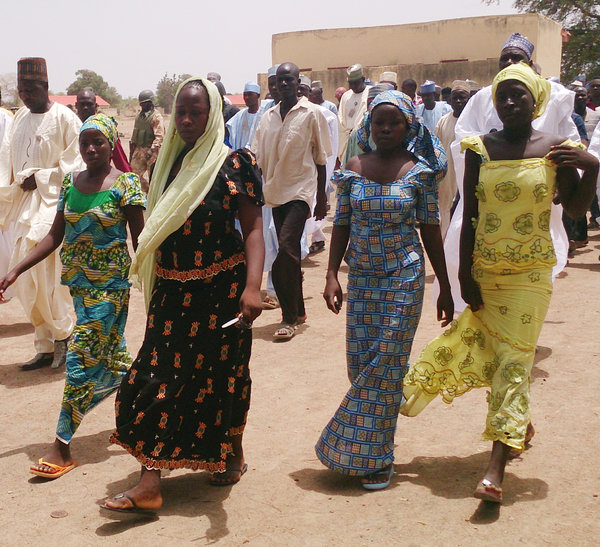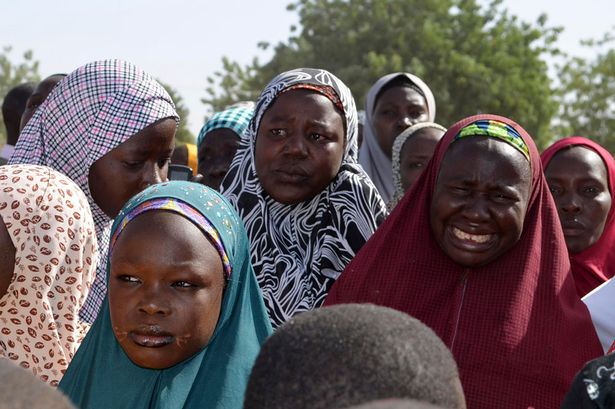As word spread like wildfire on Twitter and Facebook that Nigerian militants were preparing to auction off more than 200 kidnapped schoolgirls in the name of Islam, a very different Internet network started quietly buzzing too.
“Such news is spread to taint the image of the Mujahedeen,” wrote one dubious poster on a web forum used by Islamic militants whose administrator uses a picture of Osama bin Laden. “I have brothers from Africa who are in this group,” attested another, insisting that they were like “the Quran walking the earth.”
Boko Haram, the cultlike Nigerian group that carried out the kidnappings, was rejected long ago by mainstream Muslim scholars and Islamist parties around the world for its seemingly senseless cruelty and capricious violence against civilians. But this week its stunning abduction appeared too much even for fellow militants normally eager to condone terrorist acts against the West and its allies.

“There is news that they attacked a girls’ school!” another astonished poster wrote on the same jihadi forum, suggesting delicately that Boko Haram may perhaps be killing too many noncombatants instead of armed enemies. He prayed that God would “hold them steady to the path” of Islam.
Dismay of fellow jihadists at the innocent targets of Boko Haram’s violence is a reflection of the increasingly far-flung and ideologically disparate networks of Islamist militancy, which now include the remnants of Bin Laden’s puritanical camps, Algerian cigarette smugglers and a brutal Somalian offshoot.
ALSO READ: How Borno Governor Caused 300 Schoolgirls To Be Kidnapped – WAEC
ALSO READ: Abducted Borno Schoolgirls Raped 15 Times A Day By Boko Haram – Escapee
Follow ALL the stories on the Borno School Girls’ Abduction HERE
“The violence most of the African rebel groups practice makes Al Qaeda look like a bunch of schoolgirls,” said Bronwyn Bruton, an Africa scholar at the Atlantic Council in Washington. “And Al Qaeda at this point is a brand — and pretty much only a brand — so you have to ask yourself how they are going to deal with the people who are doing things so hideous even the leaders of Al Qaeda are unwilling to condone them.”
Boko Haram is in many ways an awkward ally for any of them. Its violence is broader and more casual than Al Qaeda or other jihadist groups. Indeed, its reputation for the mass murder of innocent civilians is strikingly inconsistent with a current push by Al Qaeda’s leaders to avoid such deaths for fear of alienating potential supporters. That was the subject of the dispute that led to Al Qaeda’s recent break with its former affiliate, the Islamic State of Iraq and Syria.
What’s more, Boko Haram’s recruits and targets have always been purely local, not international. And the group is centered on a messianic leader who claims to speak with God and demands that its adherents surrender all their possessions to the group, resembling a cult, like Uganda’s Lord’s Resistance Army, more than it does an orthodox Islamist movement.
But Boko Haram and Al Qaeda’s affiliates have both overlooked those differences to cultivate an alliance of convenience, papering over disagreements in tactics and values while emphasizing shared principles. They have reaped the propaganda value of association with each other’s deadly exploits, and in limited instances perhaps even trained or collaborated together.
Their partnership demonstrates a centripetal force pulling together even disparate insurgencies against common foes. And, scholars say, Boko Haram now also represents a growing challenge to Al Qaeda as it seeks to cultivate more such affiliates among loosely Muslim or Islamist insurgencies across Africa, almost all of them far more brutally violent than even the acolytes of Bin Laden can accept.
Read the full story at The New York Times







